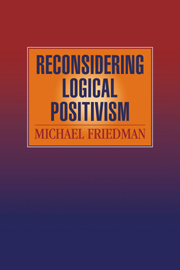Book contents
- Frontmatter
- Contents
- Foreword
- PREFACE
- INTRODUCTION
- Part One Geometry, Relativity, and Convention
- Part Two Der logische Aufbau der Welt
- Part Three Logico-Mathematical Truth
- 7 Analytic Truth in Carnap's Logical Syntax of Language
- 8 Carnap and Wittgenstein's Tractatus
- 9 Tolerance and Analyticity in Carnap's Philosophy of Mathematics
- Bibliography
- Index
8 - Carnap and Wittgenstein's Tractatus
Published online by Cambridge University Press: 05 June 2012
- Frontmatter
- Contents
- Foreword
- PREFACE
- INTRODUCTION
- Part One Geometry, Relativity, and Convention
- Part Two Der logische Aufbau der Welt
- Part Three Logico-Mathematical Truth
- 7 Analytic Truth in Carnap's Logical Syntax of Language
- 8 Carnap and Wittgenstein's Tractatus
- 9 Tolerance and Analyticity in Carnap's Philosophy of Mathematics
- Bibliography
- Index
Summary
In his “Intellectual Autobiography,” Carnap makes it clear that Wittgenstein – that is, the Wittgenstein of the Tractatus – was the philosopher who, after Frege and Russell, had the greatest influence on Carnap's own philosophical thinking. For it was from Wittgenstein's Tractatus that he derived his characteristic conception of logical and analytic truth:
For me personally, Wittgenstein was perhaps the philosopher who, besides Russell and Frege, had the greatest influence on my thinking. The most important insight I gained from his work was the conception that the truth of logical statements is based only on their logical structure and the meaning of the terms. Logical statements are true under all conceivable circumstances; thus their truth is independent of the contingent facts of the world. On the other hand, it follows that these statements do not say anything about the world and thus have no factual content. (1963a, p. 25)
Whereas Frege and Russell had shown that all mathematical truth is logical – and therefore, for those who accept the view that all logical truth is analytic, that mathematical truth is also analytic – Wittgenstein was the first to articulate the true nature of logical truth itself: the truths of logic are tautologies that necessarily hold in all possible circumstances and hence say nothing about the world.
This conception of the tautologous character of logical and mathematical truth represents, for Carnap, the most important point of agreement between his philosophy and that of the Tractatus.
- Type
- Chapter
- Information
- Reconsidering Logical Positivism , pp. 177 - 197Publisher: Cambridge University PressPrint publication year: 1999
- 3
- Cited by

